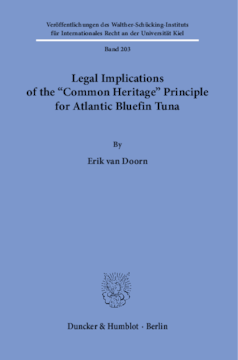Legal Implications of the »Common Heritage« Principle for Atlantic Bluefin Tuna

BOOK
Cite BOOK
Style
Format
Legal Implications of the »Common Heritage« Principle for Atlantic Bluefin Tuna
Veröffentlichungen des Walther-Schücking-Instituts für Internationales Recht an der Universität Kiel, Vol. 203
(2021)
Additional Information
Book Details
Pricing
About The Author
Erik van Doorn ist wissenschaftlicher Mitarbeiter am Walther-Schücking-Institut für Internationales Recht an der Christian-Albrechts-Universität zu Kiel und Postdoktorand am GEOMAR Helmholtz-Zentrum für Ozeanforschung Kiel. Er hat in Groningen, Utrecht und Tromsø studiert. Erik hat in der Rechtsabteilung des Internationalen Seegerichtshofs in Hamburg gearbeitet. In seiner Forschung konzentriert er sich auf marine Ressourcen, marine Raumplanung, Aspekte der marinen Aufnahme von Kohlenstoffdioxid und den Rahmen für die Meeresbeobachtung. Seit 2017 ist Erik Mitglied des wissenschaftlichen Lenkungsausschusses des internationalen Projekts Surface Ocean - Lower Atmosphere Study (SOLAS).Abstract
Many fisheries management systems have individual rights at their basis but are not always successful. The question is what would have to change in fisheries law when community rights form the basis of management. Applying this idea globally, the principle of the common heritage of humankind could provide a future foundation. The principle incorporates intra- and intergenerational justice and has a clear biocentric component but is now only applicable to the ocean floor beyond national jurisdiction and to celestial bodies other than Earth. If this principle would also apply to highly migratory fish species like Atlantic bluefin tuna, not only an analysis of the applicable law but also of the principle´s roots in environmental ethics, the economic consequences of such application and a comparison with the idea of public trusteeship provide helpful insights. It appears that the common heritage of humankind can enable both utilisation and preservation of natural resources.
Table of Contents
| Section Title | Page | Action | Price |
|---|---|---|---|
| Acknowledgments | 5 | ||
| Inhaltsverzeichnis | 9 | ||
| A. Introductory Remarks | 11 | ||
| I. Towards a Research Question | 12 | ||
| II. Atlantic Bluefin Tuna | 16 | ||
| III. Methodology | 17 | ||
| IV. Structure | 20 | ||
| B. On the Freedoms of the High Seas | 22 | ||
| I. Freedom of Fishing | 24 | ||
| II. Basis of International Fisheries Law | 27 | ||
| III. Cooperation in International Fisheries Management | 31 | ||
| IV. Utilisation and Conservation in International Fisheries Law | 35 | ||
| V. Responsibility in International Fisheries and for the Ecosystem | 39 | ||
| VI. Fisheries Management concerning Atlantic Bluefin Tuna | 43 | ||
| VII. Illegal, Unreported and Unregulated Fishing | 49 | ||
| C. On the Common Heritage of Humankind | 52 | ||
| I. Towards a Marine Common Heritage | 55 | ||
| II. Common Heritage as Limitation of the High Seas Freedom | 58 | ||
| III. Comparison with Other Regimes | 61 | ||
| IV. Difficulties of Denomination | 64 | ||
| V. Positive Law and Natural Law | 69 | ||
| VI. Sources of International Law | 78 | ||
| 1. International Conventions | 83 | ||
| 2. International Custom | 85 | ||
| 3. General Principles of Law | 89 | ||
| 4. Fundamental Principles of International Law | 99 | ||
| 5. Subsidiary Sources | 103 | ||
| 6. Soft Law | 105 | ||
| VII. Common Heritage: Old Wine in a New Bottle? | 113 | ||
| VIII. Common Heritage in International Fisheries Law | 119 | ||
| D. On Justice Between Humans and Their Natural Environment | 124 | ||
| I. Intragenerational Justice | 124 | ||
| II. Peaceful Use as a Prerequisite for Justice | 129 | ||
| III. Intergenerational Justice | 131 | ||
| IV. Biocentric Justice | 135 | ||
| V. The Price of Conservation | 144 | ||
| VI. Justice in International Fisheries Law | 147 | ||
| E. On Public Trusteeship | 155 | ||
| I. Management and Public Trusteeship | 159 | ||
| II. Non-Appropriation as a Prerequisite for Public Trusteeship | 165 | ||
| III. Public Trusteeship in Contemporary Fisheries Management | 173 | ||
| IV. Public Trusteeship in Fisheries de lege ferenda | 177 | ||
| V. Economic Aspects of Public Trusteeship in Fisheries | 184 | ||
| F. By Way of Conclusion: Picking up the Threads | 189 | ||
| Legal Instruments | 194 | ||
| Cases | 199 | ||
| Bibliography | 201 | ||
| Person and Subject Index | 236 |
